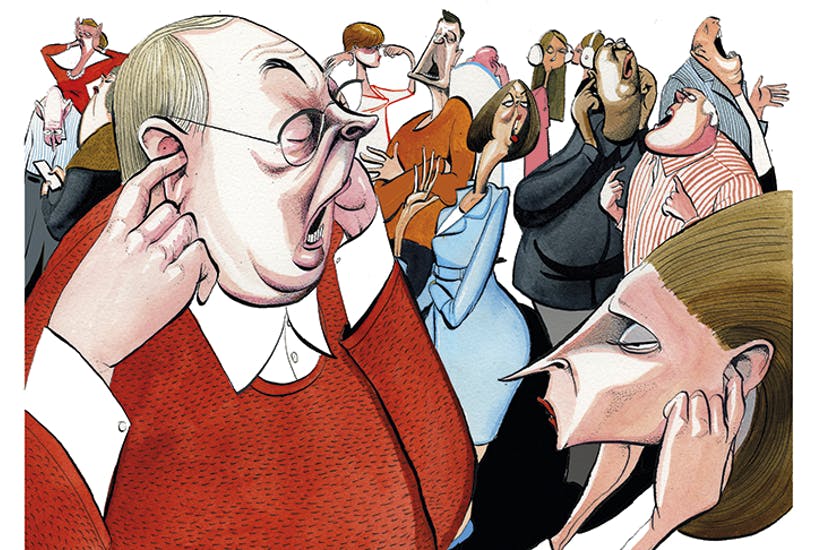Reality seems thinner these days. As I walk along the high street, passers-by drift apart as though afraid of crossing auras. Three months of lockdown has made this repulsion of human contact a matter of instinct. I can’t help but see this tendency reflected in the escalating intolerance and hostility on social media. So at the start of the week I decide to spend a few days away from Twitter. It’s not the ideal forum for civilised debate at the best of times, but even some of those I respect are now behaving like poorly socialised children who’ve just learnt some flashy new expletives. J.K. Rowling is bombarded for holding views about biological sex differences that would have been considered self-evident only a decade ago. In these ongoing culture wars, it never ceases to amaze me how much those who are supposedly on ‘the right side of history’ seem to thrive on bullying and dehumanising those who disagree. They’re like the inquisitors of the Middle Ages, incinerating the Cathars in the name of love.
It’s been quite a week for the high priests of social justice. The notion of collective guilt is enjoying a resurgence, and ‘whiteness’ is the modern-day Original Sin. The latest article of faith is ‘systemic racism’, which is now routinely invoked by politicians, celebrities and media commentators. Even our universities are said to be simmering crucibles of white supremacy. That the available statistics suggest the opposite is taken as further evidence of oppressive systems that refuse to acknowledge the lived experience of marginalised groups. The genuinely liberal approach is to resist all instances of racism, sexism and homophobia. The religion of social justice, on the other hand, sows division by assuming that hatred of minorities is all-pervasive and that collective atonement is the only remedy. I’m with the liberals on this one.
For television appearances over Skype during the lockdown, I’ve started to avoid the seemingly compulsory backdrop of well-stocked bookshelves. Early in the lockdown, I realised that some viewers seemed to be paying more attention to my books than to what I was actually saying. I hadn’t even thought to rearrange my tomes in such a way as to make myself look more cerebral. If I had, perhaps my Maeve Binchy collection wouldn’t have been quite so prominent.
The recent craze for demolishing statues has set my mind on a slippery slope. Is it really any great leap to suppose that the same activists who would see a statue of Mahatma Gandhi toppled for his ‘problematic’ views might not wish the same fate on Eric Gill’s sculpture of Prospero and Ariel on the facade of the BBC’s Broadcasting House? After all, this was a man who admitted to sexually abusing his daughters and the family dog, without the saving grace of having liberated India from the Raj. This week I’ve read the autobiography of the 16th-century Florentine goldsmith Benvenuto Cellini, whose bronze sculpture of Perseus with the head of Medusa is one of the defining images of Italian Mannerism. In spite of his claim to have developed a visible halo, it is clear that Cellini was no saint. He admits to seducing a 13-year-old girl, committing multiple homicides, and conjuring demons in the Colosseum. His Perseus stands in the Piazza della Signoria in Florence, his eyes lowered from the severed head he proudly holds aloft. It is an unforgettable sight, at once elegant and brutal, and I am relieved that the mania for expunging the sins of the past has not caught the imagination of our Italian cousins.
This bloodlust for moral purity has been extended to old comedy shows. Streaming services have been busy giving the Year Zero treatment to the likes of Little Britain and The Mighty Boosh. Even the famous ‘Don’t mention the war’ episode of Fawlty Towers was caught up in the purge, before being fished out of the memory hole after a public backlash. I have no objection to those who might find these shows offensive, but surely the best solution is simply not to watch them. We are living through a frenzy of conformity; sensitive issues are avoided and major corporations — surely the least qualified to pontificate on ethical standards — are taking it upon themselves to educate the masses. If you ask Alexa — Amazon’s virtual home assistant — whether ‘all lives matter’, she rattles off a little sermon about how ‘black lives are disproportionately in danger in the fight against systemic racism and injustice’. And I’d assumed she was just there to help with the shopping.
Andrew Doyle is a comedian and author and the creator of Titania McGrath.






Comments